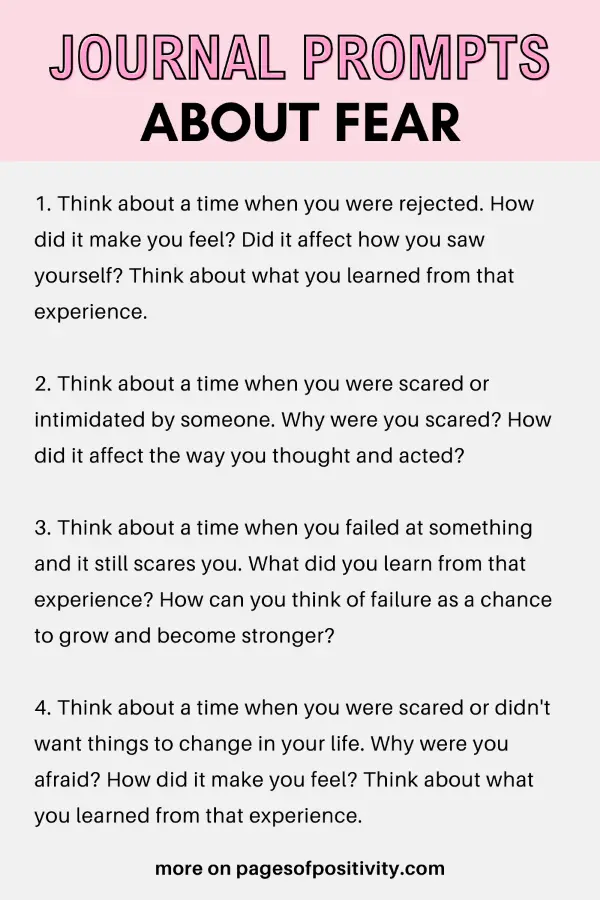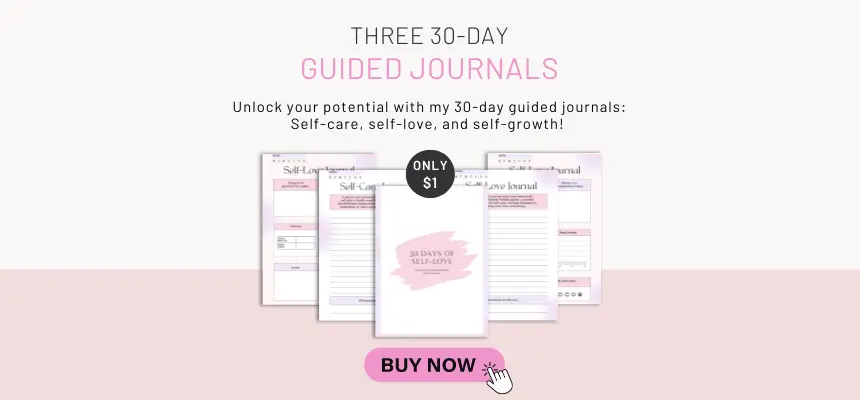50 journaling prompts to help you overcome fear
If you’re here to see journal prompts about fear, you’re in the right place. We’ll explore the power of journaling to conquer fear.
Fear, in its many forms, can hold us back from living our best lives. But by delving into our fears through journaling, we can find the strength and resilience to overcome them.
In this post, I’ll give you 50 journal prompts about fear designed to unravel fear’s grip and ignite our courage. Let’s dive in and discover the transformative power of self-reflection and the courage within.


This post may contain affiliate links. That is, if you click on a link and buy something I recommend, I will receive a small compensation at no additional cost to you.
50 good writing prompts about fear
Journal prompts for fear of rejection
- Think about a time when you were rejected. How did it make you feel? Did it affect how you saw yourself? Think about what you learned from that experience.
- Write about a time when you were too afraid of being rejected to go after something you wanted personally or professionally. Why were you scared? How did it stop you from taking action?
- Imagine a situation where you face your fear of rejection directly. Picture yourself accepting rejection as a normal part of life and using it to learn and grow. Describe how this change in thinking would make you feel empowered.
- Write a letter to yourself, giving encouragement and support in case you face rejection. Remind yourself that you’re valuable, strong, and have a lot to offer. Talk about the importance of taking risks even when you’re scared.
- Think about how you see rejection. Do you think it means you’re not good enough, or is it just a result of circumstances and personal preferences? Challenge any negative beliefs about rejection and see it as a redirection to something better for you.
- List five successful people who faced rejection before they achieved their goals. Look up their stories and see how they used rejection to grow and succeed. Get inspired by their strength.
- Describe a time when you rejected yourself before giving others a chance to reject you. Think about why you did that and find ways to accept and be kind to yourself.
- Write about a specific fear of rejection that’s holding you back in an important part of your life. What can you do to gradually face and overcome this fear? Think about strategies and support systems that can help you through possible rejection.
- Remember a time when you took a risk and faced the possibility of rejection, but it turned out well. How did it feel to overcome your fear and take action? Remember your strength and resilience when dealing with rejection.
- Imagine a life where you’re not controlled by the fear of rejection. Describe the opportunities and experiences you would pursue fearlessly. Embrace the freedom that comes with letting go of the fear of rejection and being true to yourself.
You might also like: Explore trust through journal prompts for trust issues
Journal prompts for fear of other people
- Think about a time when you were scared or intimidated by someone. Why were you scared? How did it affect the way you thought and acted?
- Write about a time when you were too afraid of what others might think to be yourself. How did it make you feel, and what can you learn from that experience?
- Imagine a situation where you face your fear of what others think about you. How would your life be different if you could overcome this fear? Describe the good changes you imagine.
- List three people in your life who intimidate or scare you. Think about why you’re scared and if it’s based on real reasons or just assumptions.
- Remember a time when someone criticized you or gave you negative feedback. How did it make you feel about yourself? What can you learn from that to overcome your fear of what others think?
- Describe a situation where you didn’t pursue something you loved because you were scared of what others would think. How did it stop you from growing and being yourself? Think about how you can overcome this fear.
- Write a letter to someone who has been holding you back with their judgment or opinion. Talk about your feelings, worries, and dreams. Challenge any fears they’ve put on you and take back your power.
- Think about how social media affects your fear of others. How does comparing yourself to others or seeking validation affect your well-being? Think of ways to accept yourself and not worry about what others think.
- Write about someone you admire or look up to. What qualities do they have that make you feel scared or inferior? Think about how you can change your perspective and embrace those qualities in yourself.
- Imagine a life where you’re not afraid of what others think. Describe how you would be different, pursue your dreams boldly, and have healthier relationships. Think about the good things that can happen when you let go of this fear.
You might also like: Journal prompts about overwhelm to help you calm down

Journal prompts for fear of failure
- Think about a time when you failed at something and it still scares you. What did you learn from that experience? How can you think of failure as a chance to grow and become stronger?
- Write about a dream or goal that you’re scared to pursue because you’re afraid of failing. Think about why you’re afraid, and try to challenge any beliefs that are holding you back.
- Imagine a situation where failing is not seen as a bad thing but as a step toward success. Describe how failing can teach you important lessons, help you grow, and give you new opportunities.
- Write a letter to yourself, understanding that you’re scared of failing and giving yourself encouragement and support. Remind yourself that failing is normal and that your worth is not based on what you achieve.
- Think about successful people who failed before they achieved great things. Choose one person and talk about their story, focusing on the challenges they faced and how they used failure to become successful.
- Explore the idea of “failing forward.” Describe a situation where you can use this approach, thinking of failure as a necessary part of progress. Think about the benefits and opportunities that can come from embracing failure.
- Write about what might happen if you let the fear of failure control your actions. Think about how your life could be different if you were willing to take risks and not be afraid of failing. What opportunities might you be missing out on?
- Think about how the expectations and judgments of others contribute to your fear of failure. How can you ignore what others think and focus on your own growth and journey?
- List three skills or things you want to learn but are avoiding because you’re scared of failing. Write about why these things are important to you and how overcoming the fear can help you grow personally and professionally.
- Imagine a life where the fear of failure doesn’t hold you back. Describe the brave actions you would take, the goals you would pursue, and the positive mindset you would have. Picture the sense of pride and achievement that comes from facing challenges and overcoming them.
You might also like: Forgiveness journal prompts for the path of forgiveness
Journal prompts for fear of change
- Think about a time when you were scared or didn’t want things to change in your life. Why were you afraid? How did it make you feel? Think about what you learned from that experience.
- Write about a time when you were too scared of change to try new things or make necessary adjustments. What good things or benefits did you miss out on because of this fear? Think about how you can overcome this fear in the future.
- Imagine a situation where you embrace change as a chance to grow and transform. Describe the good changes that can happen when you step out of your comfort zone.
- Write a letter to yourself, understanding your fear of change and offering support and encouragement. Remember how strong and adaptable you are and how change can lead to personal growth and new beginnings.
- Think about times in the past when change led to good things or personal growth. Describe the fears you had at first and how those fears changed as things progressed. Use these experiences as proof that change can be good.
- List three parts of your life where you don’t want things to change. Think about why you’re resisting and if it’s because you’re scared or want to stay comfortable. Think about the good things that could happen if you embraced change in those areas.
- Write about what could happen if you keep avoiding change in your life. How might it stop you from growing personally and professionally? Think about the missed opportunities and experiences that could come from being scared of change.
- Think about embracing uncertainty and not knowing what will happen. Write about a time when you faced uncertainty bravely and openly. Think about how it helped you grow and learn more about yourself.
- Describe a change that you’re facing or expect to face soon. Identify the fears that come with this change, and think about ways to manage and handle those fears. Consider reaching out to others who have gone through similar changes for support.
- Imagine a life where you fully embrace change. Describe the feeling of freedom, growth, and excitement that comes from trying new things and adapting to different situations. Imagine the positive impact that embracing change can have on your overall happiness.

Journal prompts for fear of uncertainty
- Reflect on a time when you felt very unsure about something. Describe the feelings and thoughts you had during that time. What were the things you were afraid of that made you uncomfortable with not knowing?
- Write about a situation where you successfully dealt with not knowing what would happen. How did you handle the uncertainty? What lessons did you learn from that experience that can help you overcome the fear of not knowing in the present?
- Imagine a situation where you fully embrace not knowing as an opportunity to grow and learn. Describe the positive things that can happen when you step into the unknown and let go of the need to be in control all the time.
- Write a letter to yourself, giving yourself encouragement and support when you feel unsure about something. Remind yourself that you are strong and can adapt to new situations. Talk about how not knowing can lead to discovering new things and becoming a better person.
- Think about times in your life when not knowing led to good things happening. Describe how those experiences challenged and expanded your way of thinking. Use those moments as reminders that not knowing can bring about positive changes.
- List three areas of your life where you feel uncomfortable with not knowing. Explore why you are afraid and if there are any patterns or beliefs that contribute to your discomfort. Challenge those beliefs and try to see things from a different perspective.
- Write about what could happen if you always seek certainty and avoid not knowing. Think about how this mindset could limit your personal growth, relationships, and overall happiness. Consider the missed opportunities that may come from being afraid of not knowing.
- Think about how staying in the present moment and being mindful can help you cope with not knowing. Describe how being present can reduce anxiety about the future and help you accept uncertainty.
- Describe a specific situation or decision that you are uncertain about right now. Think about the different possibilities and outcomes that exist. Explore ways to manage your fear and stay calm when you don’t know what will happen.
- Imagine a life where you accept not knowing as a natural part of being human. Describe the freedom and sense of adventure that come from letting go of the need for absolute certainty. Picture yourself embracing the unknown with curiosity and strength.

FAQ: How can fear hinder your life?
Paralysis and inaction
Fear can hold us back, making us feel stuck and unable to move forward. It creates a feeling of being trapped or unable to escape.
This stops us from taking risks, chasing our dreams, or grabbing opportunities that could help us grow personally and professionally.
Limited belief systems
Fear often distorts our perception of ourselves and the world around us. It breeds self-doubt and a belief in our own limitations.
This causes us to underestimate our abilities and potential. This restricted mindset can prevent us from exploring new paths, embracing challenges, and reaching our full potential.
Missed opportunities
Fear can be like a wall that keeps us from exploring the unknown. It makes us avoid new things, relationships, or chances that could make our lives better.
When we give in to fear, we miss out on important opportunities to grow, learn, and make meaningful connections.
Stagnation and regret
When fear takes control, it stops us from growing and changing. We get stuck in situations that aren’t good for us or don’t make us happy because fear tells us that change is too dangerous or uncomfortable.
As time goes on, this can make us feel really sorry and unhappy about our lives.
Impact on physical and mental health
Fear triggers the body’s stress response, releasing cortisol and adrenaline. This can negatively impact our mental and physical health.
Weakened relationships
Fear can make relationships difficult because it creates doubt, makes us feel unsafe, and makes it hard to share our emotions.
It might make us hold back, avoid being vulnerable, or build walls to protect ourselves from getting hurt or rejected. This prevents our connections with others from being real and deep.
Diminished self-confidence
Persistent fear ruins our self-confidence and belief in our abilities. It undermines our sense of self-worth and can lead to feelings of inadequacy and imposter syndrome.
This lack of self-confidence can hinder personal and professional growth. This, in turn, makes it challenging to pursue our aspirations and make meaningful contributions.
You might also like: New month, new and good journal prompts to try
FAQ: How can you manage fear in your life?
Identify and acknowledge
Start by identifying the specific fears that are holding you back. Acknowledge their existence and understand how they manifest in your thoughts, emotions, and behaviors.
This self-awareness is crucial to taking the first step towards control.
Challenge limiting beliefs
Examine the beliefs and assumptions that underlie your fears. Question their validity and challenge the negative self-talk that reinforces them. Replace them with empowering and rational thoughts that counteract fear’s grip.
Take small steps
Gradually confront your fears by taking small, manageable steps outside of your comfort zone. Break down daunting tasks into smaller, more achievable actions.
Each successful step forward builds confidence and diminishes fear’s power.
Practice mindfulness
Engage in mindfulness techniques to stay present and grounded when fear arises. Focus on your breath, observe your thoughts without judgment, and cultivate a sense of calm.
Mindfulness helps reduce anxiety and allows you to respond to fear more effectively.
Seek support
Reach out to trusted friends, family, or professionals for support and guidance. Surround yourself with a positive and understanding network that encourages and uplifts you as you navigate your fears.
Visualize success
Try using your imagination to picture yourself overcoming your fears. Imagine vividly in your mind how you confidently face and conquer the situations that make you afraid.
This can help change how your brain thinks about those situations, so you start connecting them with positive outcomes instead of fear.
Educate yourself
Knowledge is power. Learn about the specific fears you face, whether it’s through reading books, attending workshops, or seeking professional guidance.
Understanding the root causes and triggers of your fears can help you develop effective strategies to control them.
Practice self-care
Prioritize self-care activities that promote relaxation, stress reduction, and overall well-being. Engage in regular exercise, get enough sleep, eat nourishing foods, and engage in activities that bring you joy and fulfillment.
Taking care of yourself strengthens your resilience in the face of fear.
Celebrate progress
Recognize and celebrate even the smallest victories along your journey of fear control. Give yourself credit for the steps you’ve taken, the fears you’ve confronted, and the growth you’ve achieved.
Celebrating progress reinforces positive change and motivates you to continue moving forward.
You might also like: Nurture your inner child with journal prompts for healing your inner child
FAQ: What is journaling, and how can journaling help with fear?
Journaling, a timeless and accessible tool, serves as a powerful companion on our journey to understanding and managing our fears.
Journaling is like having a private conversation with yourself. It means writing down your thoughts, feelings, and experiences in a journal.
It gives you a safe place to explore your fears, figure out where they come from, and find your inner strength and ability to bounce back.
So, how does journaling help with fear? Let’s delve deeper.
Reflection and awareness
Journaling offers us an opportunity to reflect on our fears with honesty and clarity. Through writing, we can articulate and examine the specific fears that haunt us, bringing them out of the shadows of our minds.
By shining a light on our fears, we gain a deeper understanding of their root causes, triggers, and patterns. This is the first step towards conquering them.
Unveiling limiting beliefs
Fear often stems from limiting beliefs we hold about ourselves, others, or the world around us. Through journaling, we can identify and challenge these beliefs, unraveling their grip on our psyche.
By questioning their validity and exploring alternative perspectives, we create space for new possibilities and foster a more empowering mindset.
Emotional release and processing
When we’re scared, we might feel a mix of emotions like anxiety, worry, dread, and insecurity. Journaling can help us let those emotions out. It’s like a release valve, letting us pour out our feelings onto the pages.
By acknowledging and expressing our fears through writing, we release their emotional weight. This offers relief and creates a sense of emotional clarity and peace.
Problem-solving and action planning
Journaling empowers us to shift from a passive stance toward fear to an active one. By exploring our fears in writing, we can brainstorm potential solutions, strategies, and action plans.
Journaling helps us develop a roadmap to navigate fear-inducing situations. It empowers us to take practical steps forward and dismantle fear’s hold on our lives.
Cultivating self-compassion and empowerment
When we’re afraid, we often criticize ourselves, doubt our abilities, and feel like we have no control. Journaling lets us be kind to ourselves and feel stronger.
By writing, we can show ourselves understanding, kindness, and support. It’s a way to empower ourselves and feel better.
We can also document our triumphs, celebrate our strengths, and remind ourselves of our resilience. This fosters a sense of inner courage and self-belief.
Did you find any new journal prompts for fear to use in your fear journal?

I consider myself an expert when it comes to positive affirmations, journaling, and inspirational quotes. My blog is all about spreading good vibes and helping you feel awesome! I’ve got loads of cool stuff for you to explore, like uplifting affirmations that can boost your confidence, fun journal prompts to spark your creativity, and inspiring quotes to motivate you every day. Let’s embark on this amazing journey together as we discover more about ourselves, uncover our hidden strengths, and create a life that’s full of happiness and success.








I appreciate the efforts of the person who has written these journal prompts.these journal prompts are really helpful to explore our own negative thinking patterns,thankyou.